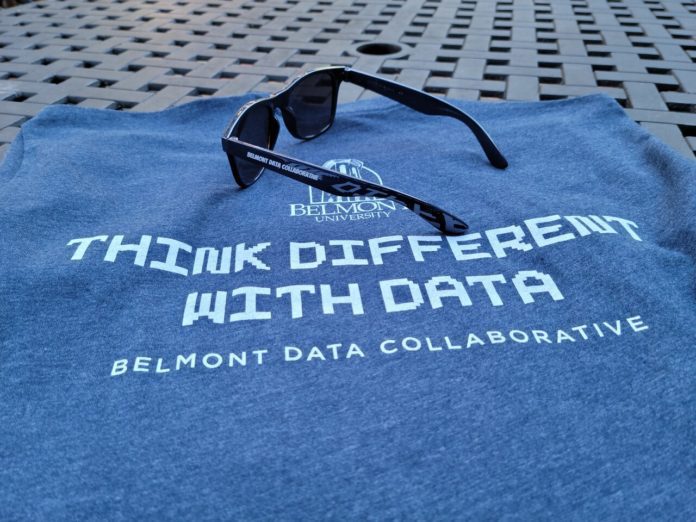Partnership to Embed Data Literacy Skills into All Belmont Curriculum to Prepare Students for Employment in Today’s Data-Rich Climate
All Belmont graduates will soon possess highly-sought after data fluency skills thanks to a new partnership between the Belmont Data Collaborative, a University-wide effort to help people and communities flourish by uniting academia and industry through data, and Juice Analytics, a design-led technology company changing the way people visualize and communicate with data. This partnership will integrate a new data storytelling process into every discipline across the University, ensuring students from every major leave with the skills they need to solve complex problems in their industries and drive data-informed social innovation.
BDC Executive Director Dr. Charlie Apigian says data storytelling is essential for all people, in all industries. “Our goal in this partnership is to make data accessible to everyone to apply data and solve real-life problems through the familiar, engaging form of storytelling. Too often people assume that providing insights is the final step in the process,” he explained. “We aim to take it a step further by creating data stories that compel action.”
The new Juice Analytics collaboration will develop and use a standard Data Story Creative Process that will drive all Belmont students through the journey from problem formulation and data insights to an actionable data story. This process will be integrated into curriculum across all campus disciplines. The result will be a new generation of students who understand how to think differently about data and leverage their findings to solve problems.
Zach Gemignani, co-founder and CEO of Juice Analytics, said, “Our collaboration with Belmont is an exciting opportunity for us to bring our data storytelling approach and capabilities to students across many disciplines. Under Charlie’s leadership, the BDC has an ambitious and innovative vision that we want to be part of.”
With Juice Analytics as Belmont’s technology partner, students will have access to the company’s innovative data storytelling platform Juicebox, a critical component of the Data Story Creative Process. The Juicebox web platform allows anyone at any level to create simple, engaging data presentations to better communicate their message with data.
Data fluency is no longer expected only of scientists, financial analysts or engineers. Professionals like journalists, film makers, community activists and more are increasingly expected to be data-driven problem solvers on top of being creative and artistic. Connecting with audiences of today and tomorrow requires an extra boost from convincing facts and figures, and Belmont is committed to preparing all students, regardless of area of study, with these skills.
Instructor Jen Duck’s Arts, Entertainment and Culture Reporting course piloted the program last fall for journalism, video production and emerging media majors. This experience illustrated how students with no prior data education can quickly learn to use data visualization to tell more compelling stories.
Apigian and Gemignani visited the class to teach the basics of Juicebox and data collecting. Students were assigned a project telling original stories of their choosing and used this basic lesson to find relevant data. The visualizations created in Juicebox told their stories, helping the audience understand the content more clearly.
Sofia Pfaffl, a video production and creative entertainment industry studies senior, used Juicebox to illustrate the history of Nashville’s population growth as part of her story on balancing the city’s positive growth while correctly preserving its history and culture in the face of gentrification, which can be viewed here. “My education as a Video Production major centers on the integral aspect of visual storytelling. By incorporating data into my story, readers are provided with a deeper understanding of the significance of the story,” Pfaffl explained. “The more data a story contains, the more credible the message becomes. Presenting data visually keeps the story fresh and the readers engaged.”
Apigian said, “Examples like this are much deeper than what you see on the surface, and data can help inform those stories, but most people don’t get to that level. These students from the Curb College exemplify how data can help audiences better understand important, niche topics. This Data Story Creative Process will help equip all our students to become data storytellers and to use data to solve the world’s most complex problems.”
The BDC also hosted a data hackathon in November further piloting students’ use of Juicebox, giving a first glimpse at how data storytelling can be embraced by students from all areas of campus. With 70 students from 22 different majors gathered to collaborate and talk about data alongside 10 companies, the need and hunger from students, faculty and the community for data skills was evident. These types of events will continue and expand as the BDC gains momentum and all students begin seeking further data fluency as the Juice Analytics partnership starts appearing in all classrooms.
Soon, Belmont students in every discipline will finish their degree having gone through the same Data Story Creative Process and graduate with skills they need to take real-world problems head on in their own fields.



